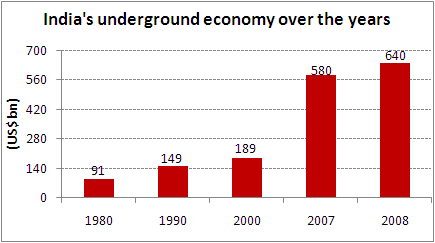By- Suhani Gupta
Classrooms, seminars, conferences etc., often witness discussions and debates about the wide-ranging effects of informal trade on the economy, considering that a large proportion of the population is now landing in the so-called ‘hidden’ sector of the country. It is a fact that India’s underground economy has been mushrooming over the years. Now and then, we often hear people argue about how this sector of the economy contributes to employment and production in the economy. It is true that this section of the economy is responsible for the creation of millions of jobs in a country where population growth outstrips formal job creation. The bulk of new jobs created in the past few years was most likely created due to the informal sector and not the flashy high salaried positions in MNC’s.
Some believe that the existence of this huge underground economy is why probably the population is being able to survive the sad state of the economy. However there is no doubt about the fact that the ill effects of the underground sector outweigh the benefits. The negative effects of informal exchange are in-numerous. There is activity in this kind of trade, but no addition to the country’s GDP, which is also a major cause for underestimation of the output level of the economy. Put in simple words, it is ‘activity without productivity’. Since this counterfeit economy is not accounted for, the official economic accounts fail to present before us a true picture of the state of the economy.

large loss of tax revenue for the government, which disturbs the public finances.
Informal trade is prevalent in many countries, however it is only in India that this kind of trade deeply affects the citizens of the country. Today, we witness informal payments in all kinds of matters, be it education, health, water and electricity departments, or escape from law and order. It is high time that all of us understand the need for accounting all exchange that takes place in the economy; this is truly vital for accurate assessment of the country’s growth. The way forward is not a bed of roses, and needs brave action and strict surveillance to incorporate the informal sector of the economy into the formal one.
































